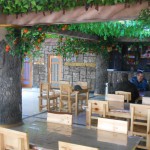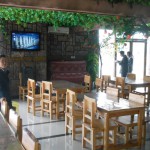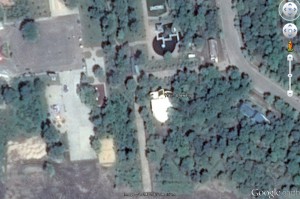UPDATE 3 (2014-8-14): Reader Théo Clément sent these pictures of the interior of the beef factory/bar:
UPDATE 2 (2014-8-6): Here is an interview (in English) on Radio Praha with Martin Kovář about the brewery.
UPDATE 1 (2014-7-15):
Pictured above (Google Earth): The new brewery in Rajin
One of the individuals involved in setting up the brewery gave this interview (in Czech). NK News translated some of it:
Zvu Potez Sales Director Martin Kovar said that North Korean representatives in the Czech Republic contacted his company directly, saying they wanted to open a brewery in the DPRK with Czech expertise.
“We took them to a few Czech microbreweries so they could examine them and know what to expect from them,” he said, “And they chose a type of beer that most of them liked”.
The brewery subsequently opened in December last year, with equipment brought directly to the site in shipping containers from Prague, via the Russian railway line across Siberia from Khasan in Russia to Rajin port.
According to visitors to the Rason area in late 2013, two staff from the Zvu Potez company arrived in Rajin to help set up the site and train three to four locals in how to use and maintain the brewery.
Among the Czech staff was Tomáš Novotný, who worked as Chief Technologist for Zvu Potez in North Korea for six months while the brewery was being set up.
His job, he told NK News in an email, was to give the North Koreans the “know-how” and supervise the production of the first beer, which he said would be brewed primarily for the local market.
…
The Czechs have now all returned home, he said, and the brewery is under the full direction of the North Koreans.
And according to Radio Free Asia:
North Korea then opened a microbrewery in the Rason Special Economic Zone in late 2013 and equipped it entirely with Czech-made appliances and hardware.
In addition to the equipment, Novotny explained that the ingredients – malt, hop, and yeast – were also imported from the Czech Republic.
In this effort, brewing technologist Novotny stayed in the North for six months, beginning last October, to teach two North Koreans what he knows about beer.
Novotny added, however, he does not know what the North plans to do once they use up the one-year supply of ingredients from his country.
So why is the impoverished country striving to improve the quality of its beer? It may be that better beer means better business.
While beer at the bar in Rason is free for locals, tourists must pay about 70 U.S. cents per pint, according to the North Korea-focused website NK News.
Pyongyang is also encouraging foreign visitors to take a tour of its various microbreweries, including the Rakwon Paradise , the Taedonggang Craft Brewery, and the Yanggakdo Hotel Microbrewery.
The Czech company’s work on the Rason brewery has come to an end, and it does not intend to send more experts unless North Korea places additional orders.
ORIGINAL POST (2013-12-2): An article in Forbes tells us that Rason is getting a new Czech brewery:
Tomas Novotny has been in North Korea two days, and he looks frazzled. It was a long journey from Prague, and standing on the street in downtown Rajin, his government minder by his side, he can already see that doing business in the DPRK’s remote northeast will present an unusual set of challenges.
…
Novotny is here because of that railway line. A brewing technologist with the Czech firm Zvu Potez, he has come to set up a brewery. All the equipment and materials were transported by train–from Prague to Moscow, through Siberia and onto the branch line of the Trans-Korean main line.
“We’re still building the brewery. Come and see it,” says Novotny. The two containers that brought the Zvu Potez equipment from Prague lie 50 meters from the brewery. It’s a great location by the sea in Rajin’s main park. The business is a joint venture between the Czech firm and the Rason regional government, says Novotny, and will target tourists and foreigners. There are about 300 Western tourists–including Russians–a year and about 20,000 Chinese visitors to the country’s northeast.
“When they’ve finished building,” he says, shouting over the drilling, “I’m going to teach three or four locals how to brew. I hope they can speak English. If they can’t it will be interesting.”
He expects to be in Rason for six months establishing the business, but already he misses home and his young son. “I won’t get to speak to them until I go home at Christmas,” he says.



